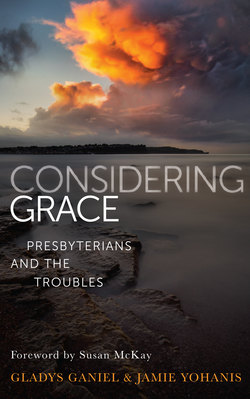Читать книгу Considering Grace - Gladys Ganiel - Страница 9
На сайте Литреса книга снята с продажи.
ОглавлениеForeword
Strangely, it is the small red light of a cigarette burning in the darkness of a graveyard that stays with me as a guide through this compelling book. The man smoking the cigarette is sitting on the grave of his murdered parents, and the person who has been searching for him is his minister, alerted by the man’s wife that her husband has gone missing in the night, again. Considering Grace is largely preoccupied with examining how the Presbyterian Church of Ireland (PCI) handled the Troubles, and since many of the interviews at its core are with those directly affected by traumatic incidents, there are a lot of glimpses of people struggling with desperate grief – those who could cite, as one person does, Psalm 88: ‘You have taken my friends and loved ones from me. Darkness is my closest friend.’
There is a teenage boy crying as he tramps along Ballycastle Beach shouting at God through the roar of the wind and the waves, because he cannot fathom how a God who is meant to represent goodness could have allowed his brother to be killed. There are two little girls following their murdered father’s coffin crying out, ‘Daddy! Daddy!’ Another child is overheard by her mother praying to God to bring her father back ‘like Lazarus’. There is a woman whose lamentation for her husband is expressed by absolute silence – she never in her long life after his death mentions his name again. One person says, ‘There’s no God to let a tragedy like that happen.’
Before the outbreak of the conflict, in 1961, 28 per cent of the NI population were members of the PCI. Inevitably, therefore, many of its flock had to pass through what the psalmist calls ‘the valley of the shadow of death’. Among the Presbyterians killed there were members of the security forces, members of loyalist paramilitary groups, and, mostly, ordinary people. The book has searching interviews with people whose faith that their God was with them ‘to the very ends of the earth’ was deeply challenged, and those who struggled to comfort the bereaved. They include first responders, schoolteachers and ministers. One schoolteacher describes trying to comfort a young girl who was tormented because, after a bomb blast, her friend had asked her to help her search for her little brother. Instead, the frightened child had run away. The schoolteacher had to talk her through it, hoping to persuade her that God would forgive her frailty. A minister states bleakly that there is ‘no easy way’ to tell someone that a family member has been blown up or shot or abducted. There are many gestures of courage and human solidarity, like the flying of a council flag at half-mast after the sectarian murder of a Catholic, or simply visits to neighbours.
The PCI as an institution will be, and should be, unhappy with much of what Gladys Ganiel and Jamie Yohanis have found. Many people feel that the Church was too timid in the face of the aggressive scorn poured on it by Ian Paisley in his belligerent days as leader of the Free Presbyterians. That there was a failure to offer leadership, or to support those who led in difficult local circumstances. Women are critical of a refusal by the largely male hierarchy to recognise their considerable contribution to the search for reconciliation. One minister describes asking why no Catholic priests had been invited to an ‘ecumenical’ meeting. There was a silence, and then the conversation resumed as if she had not spoken. The Church needs to pay attention, not least because its flock is deserting it. By 2011, the proportion of NI people who are members had dropped to 15 per cent.
Ganiel and Yohanis take their title from the proposal by one man, who was himself bereaved, that people should ‘consider grace’, which he defines as ‘the hope that Jesus offers ... that there is a possibility of living without bitterness and walking on as somebody who is amazingly and wonderfully free’. The ultimate injustice, after all, was the crucifixion. No one who has contributed to this excellent collection of interviews tries to say that this will be easy, and nor is forgiveness always possible. Plenty will choose, as one woman does, to remain silent during the line in the Lord’s Prayer, ‘as we forgive those who trespass against us’. The authors conclude that ‘grace is difficult, but humanly possible’. This fine book contributes to the literature that tries to enable us to emerge with humanity from the darkness.
Susan McKay
September 2019
